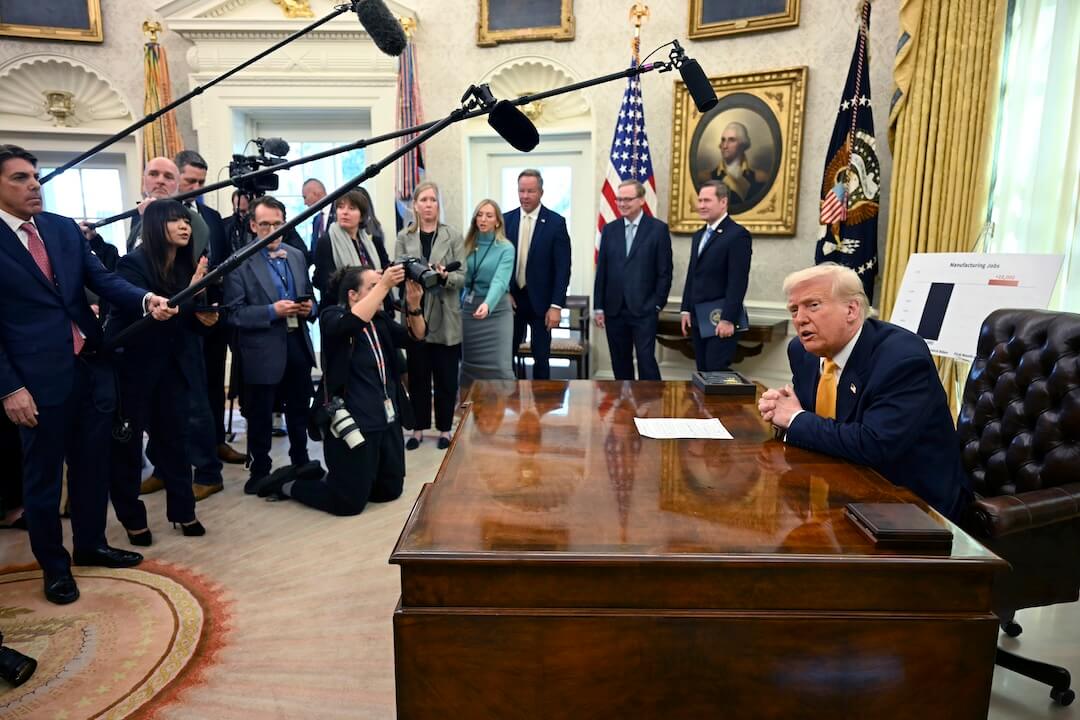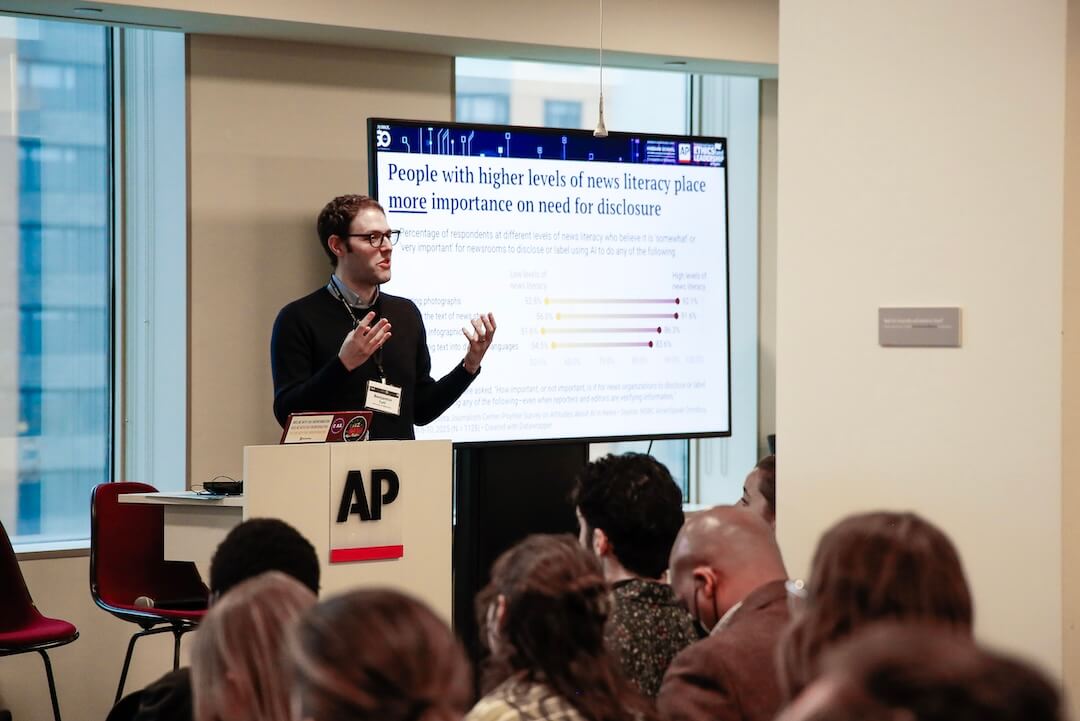It’s a story that’s cherished in the hearts of journalism students across the United States: Two enterprising Washington Post reporters, hungry for a big story, dig deep into Richard Nixon’s secretive presidency and expose wrongdoing that eventually pushes him out of office.
Except it didn’t happen that way. Not exactly. In fact, the enterprising heroes of Watergate, Bob Woodward and Carl Bernstein, were mostly chroniclers of an investigation quarterbacked by special prosecutors and elected representatives who drove it forward with the power of subpoena.
“Major historical events like the downfall of Richard Nixon and the Watergate scandal are very complex,” said W. Joseph Campbell, a journalism historian at American University. “There’s a lot of moving parts, and so forth. And one way to get around those moving parts and all the complexity of Watergate is to assign Woodward and Bernstein a central role in bringing down his presidency.”

W. Joseph Campbell, a professor at American University and the author of “Getting it Wrong,” a book on media myths now in its second edition.
The presidency-slaying heroism of Woodward and Bernstein is one of the many myths eviscerated by Campbell in the second edition of his book, “Getting It Wrong: Debunking the Greatest Myths in American Journalism.”
Released last year by University of California Press, the book also takes a two-by-four to the myth that Walter Cronkite helped end the Vietnam War and defenestrates the notion that Randolph Hearst vowed to “furnish the war” against Spain in 1898.
It may come as no surprise that journalists hold an outsize and sometimes undeserved place in the tapestry of the public imagination — after all, they are the ones who weave it together. But history has shown, time and again, that journalists are largely witnesses, not the primary actors, to America’s major historical events, Campbell said.
“If we debunk a story about Woodward and Bernstein bringing down Richard Nixon, I think we’re doing a service,” Campbell said. “Because it’s a more accurate interpretation of what was the most serious political scandal and constitutional crisis in American history.”
Below is a Q-and-A with Campbell about the rise of media myths, the cause of their stubborn persistence throughout the years and the differences between misleading mythology and the recent spike in fake news driven by social media. The questions and the answers have been edited slightly for clarity.
Your book documents and debunks many pernicious media myths — the apotheosis of Woodward and Bernstein, the genesis of the Spanish-American War, Walter Cronkite’s “Vietnam moment.” In your mind, what makes these myths so persistent?
A number of reasons. One is that, like all good myths, they are easy to retell. They’re very simplistic. They’re very straightforward, they’re not very complicated. Major historical events like the downfall of Richard Nixon and the Watergate scandal are very complex. There’s a lot of moving parts, and so forth. And one way to get around those moving parts and all the complexity of Watergate is to assign Woodward and Bernstein a central role in bringing down his presidency.
An impatience with ambiguity and complexity is one of the major reasons why these myths take hold and endure. Plus, they do tend to ratify the notion that journalists are vital players in public life. That they are at the center of important and powerful events. That’s another reason, too.
In some respects, these myths do flatter journalists, and the self-flattery is another factor.
And another reason they take hold and are so enduring is cinematic treatments. The cinema is a real powerful agent of mythmaking and propelling and solidifying media myths. The cinematic version of “All the President’s Men” — it ignored all of the other forces and factors that were at work in the Watergate scandal…and focused exclusively on Woodward and Bernstein.
So anyone watching that movie comes away from it thinking it was those two guys and their super-secret source Deepthroat who brought down Richard Nixon’s presidency. There’s no other interpretation possible from the film “All the President’s Men.” So movies have a way of solidifying media myths and making them very difficult to roll back and debunk.
Journalists are also the keepers of these stories. Does that play a part?
The stories also promote an often misleading interpretation of the power and influence of the news media. That’s another factor here. Journalists are inclined to retell these stories because not only does it flatter them, it tends to ratify their power and their influence in public life.
In the last year or so, we’ve seen a rise of fake news — falsehoods masquerading as news designed intentionally to deceive people. In your mind, do these media myths fall into that category? Why or why not?
Probably not. Sometimes it’s a bit murky as to the exact derivation of some of these tales and how they really got going. And I do know that David Halberstam, for example, was one of the first people to identify the Walter Cronkite report on Vietnam in 1968 as a really major factor.
He said in his book, “The Powers that Be,” it was the first time an anchorman declared a war to be over. And that’s not what Cronkite said. It’s simply not the case that he declared the war was over, and in fact the war in Vietnam went on for another seven years.
So it’s hard to know what Halberstam was thinking. It’s hard to know what went into that interpretation, but it is a shoddy interpretation. And it’s taken on this veneer of accuracy or factuality that is akin to a broad definition of fake news.
How much time has to pass before you know a media myth has been advanced and taken root? Do you need years of hindsight?
It does take a little bit of critical distance. It takes the passage of time to realize, yes, this does qualify as a prominent story about and, or by the news media that is widely retold and is prominent in that sense. But I think even in recent years, we’ve seen cases in which the media has really gotten it wrong, badly wrong and celebrating an interpretation that was not accurate.
In the case of Hurricane Katrina in 2005, the reporting on the aftermath of the storm in New Orleans was way off-base, depicting the city as being seized, in the grips of mayhem and Mad Max-like destruction. It just wasn’t true. But the immediate interpretation of the media’s coverage of Hurricane Katrina in the aftermath was one of telling truth to power. That the media were flexing their muscles despite a long period of upheaval and decline in the business.
Has the rise of social media made it more difficult to manufacture media myths?
I’ll grant you that Hurricane Katrina happened before the advent of Twitter or very much in the way of social media. But I think if you look at some of the more recent episodes of major stories that were covered with a breaking news element, I think you’ll find that we’ve seen the problematic aspects of reporting crop up in those instances, too.
It’s pretty clear that sloppy reporting and anecdote-driven reporting can give rise to media myths. Twitter is also a great place for the diffusion of fake quotations — quotations that are attributed to prominent people in the past, most of them dead, and there’s no way for them to say, “No, I never said that.” Twitter, and social media in general, are really great sources for that kind of misinformation.
With some critical distance, you’re able to take the long view of history in your writing. What is your assessment of the current panic about a “post-truth” society given that long view? Does it hold up to the scrutiny of historical analysis?
I don’t have a lot of patience for the idea that we are in a “post-truth” world. I mean, facts matter. The whole fundamental basis of the book, “Getting it Wrong” is to align itself with one of the fundamental missions of American journalism. That is, to get the story right, to get it factually correct the best you can.
And I don’t see that mission has diminished or gone away. I don’t think practicing journalists whom I know are engaging in a post-truth environment. But the notion that news media play fast and loose with the facts — that goes back a long, long ways.
Some of the late 19th century reporting by Hearst and Pulitzer, of the supposed yellow press of New York City back at the time, the run-up to and the aftermath of the Spanish-American War, was often criticized for being devoid of truth.
I’ve done a fair amount of research into that time period, and they weren’t out there just to make stuff up and peddle it in sensational way. They were not disinclined to the sensational treatment of news, but they went beyond that as well, especially Hearst. He had a taste for getting the story and paying a lot of money to get it reported, and reported well. I’m a little impatient of people who dismiss that period as a factually shallow time in American journalism.
How do you find media myths?
It’s like opening the refrigerator door. If something in right doesn’t smell right, you’re going to want to investigate just what that is. And so it goes with a story that may not quite seem right. It doesn’t pass the sniff test.
Your work might take some journalists down a peg in the public imagination. Do you ever regret, even slightly, diminishing the romantic notion of the crusading journalists who take down a president?
Well, I think in reality — and many journalists, I believe, realize this — that they are not really the people who control the levers of power. And that’s really not the function of journalists, to be the powerful agents in society. They’re more of a chronicler of what’s going on than a manipulator. At least, that’s the normative value that journalists in this country are taught and still intend to embrace.
I think, if we debunk a story about Woodward and Bernstein bringing down Richard Nixon, we’re doing a service because it’s a more accurate interpretation of what was the most serious political scandal and constitutional crisis in American history.
I think we get a better understanding of our past, we get a better understanding of our profession, if we strip away the barnacles of media myths from some of the most prominent stories and some of the most prominent moments in the profession.






